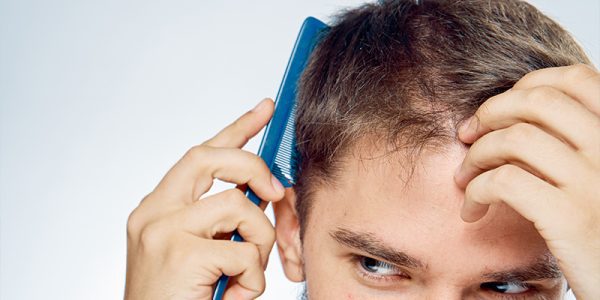
Hair loss is a common concern that affects millions of people worldwide. Among the treatments available, dutasteride has emerged as a promising option for combating hair loss, particularly in men dealing with androgenetic alopecia (male pattern baldness). This article explores what dutasteride is, how it works, its effectiveness, potential side effects, and how it compares to other treatments.
Dutasteride for Hair Loss
Dutasteride is a 5-alpha-reductase inhibitor that blocks the conversion of testosterone into dihydrotestosterone (DHT). High levels of DHT are linked to hair follicle miniaturization, a key factor in androgenetic alopecia (male and female pattern baldness). By reducing DHT levels, dutasteride helps slow hair loss and, in some cases, promotes regrowth.
How Does Dutasteride Treat Hair Loss?
Dutasteride inhibits two forms of the enzyme 5-alpha-reductase (Type I and Type II), whereas finasteride, a similar medication, only blocks Type II. This dual action makes dutasteride more effective at lowering DHT levels.
- Male Pattern Baldness: Dutasteride can significantly reduce hair thinning and promote regrowth in men with androgenetic alopecia.
- Female Pattern Baldness: Although not FDA-approved for women, off-label use of dutasteride has shown promising results, particularly for postmenopausal women.
How to Use Dutasteride for Hair Loss
Dutasteride is available in oral capsule form, typically taken once daily. The dosage and duration of treatment should be determined by a healthcare provider based on individual needs.
For those wary of systemic side effects, topical formulations of dutasteride are also available. These are applied directly to the scalp, potentially reducing the risk of side effects associated with oral use.
Potential Side Effects
While dutasteride is generally well-tolerated, some individuals may experience side effects, including:
- Sexual Dysfunction: Decreased libido, erectile dysfunction, or reduced semen volume.
- Hormonal Changes: Breast tenderness or enlargement (gynecomastia).
- Allergic Reactions: Itching, rash, or swelling.
These side effects are relatively rare and often resolve upon discontinuing the medication. Regular follow-ups with a healthcare provider are essential to monitor progress and address any concerns.
Dutasteride vs. Other Hair Loss Treatments
- Dutasteride vs. Finasteride: Dutasteride inhibits both Type I and Type II 5-alpha-reductase, while finasteride only targets Type II. This dual inhibition makes dutasteride more effective at reducing DHT levels, but it may also increase the likelihood of side effects.
- Dutasteride vs. Minoxidil: Minoxidil is a topical treatment that stimulates hair follicles to grow thicker hair. While it complements dutasteride, it does not address DHT levels. Combining the two can yield synergistic results.
- Dutasteride vs. Hair Transplants: Hair transplants provide immediate results by relocating hair follicles from donor areas to balding regions. Dutasteride can be used alongside transplants to maintain and enhance the results.
Is Dutasteride Right for You?
Dutasteride is a powerful option for individuals experiencing significant hair loss due to androgenetic alopecia. However, it’s not suitable for everyone. Pregnant women or those planning to conceive should avoid handling dutasteride due to potential risks to fetal development.
Consulting with a dermatologist or healthcare provider is crucial to determine the best course of action based on your hair loss pattern, medical history, and treatment goals.
Frequently Asked Questions About Dutasteride for Hair Loss
1. What is Dutasteride?
Dutasteride is a 5-alpha-reductase inhibitor that reduces the conversion of testosterone to dihydrotestosterone (DHT), a hormone that contributes to hair follicle shrinkage in androgenetic alopecia (pattern baldness).
2. How does Dutasteride help with hair loss?
By inhibiting DHT production, dutasteride helps slow hair loss, promotes hair regrowth, and maintains existing hair by preventing further follicle damage caused by DHT.
3. Is Dutasteride FDA-approved for hair loss?
Dutasteride is FDA-approved for treating benign prostatic hyperplasia (BPH) but is not FDA-approved specifically for hair loss. However, it is commonly prescribed off-label for androgenetic alopecia.
4. How effective is Dutasteride for hair loss?
Studies suggest that dutasteride is highly effective in treating hair loss, with many users experiencing noticeable hair regrowth and a reduction in shedding. It works by reducing DHT levels by up to 90%, making it more effective than finasteride (another DHT inhibitor).
5. How long does it take to see results with Dutasteride?
Results typically start appearing within 3 to 6 months of consistent use. Full benefits are usually seen after 12 months of treatment.
6. What is the recommended dosage for hair loss?
The typical dosage for hair loss is 0.5 mg per day, taken orally. Always follow the specific dosage and guidance provided by your doctor.
7. What are the potential side effects of Dutasteride?
Common side effects include decreased libido, erectile dysfunction, breast tenderness, and reduced semen volume. Some users may experience mood changes or allergic reactions.
8. Can women use Dutasteride for hair loss?
Dutasteride is not FDA-approved for use in women, but it is sometimes prescribed off-label for postmenopausal women with hair loss. Women who are pregnant or trying to conceive should avoid handling dutasteride due to its potential to cause birth defects.
Conclusion
Dutasteride is a highly effective treatment for androgenetic alopecia, offering hope to those struggling with hair loss. While it may come with potential side effects, its ability to significantly reduce DHT levels and promote hair regrowth makes it a valuable option in the fight against hair loss. For optimal results, always consult with a healthcare professional before starting dutasteride or any other hair loss treatment.

Leave a Reply